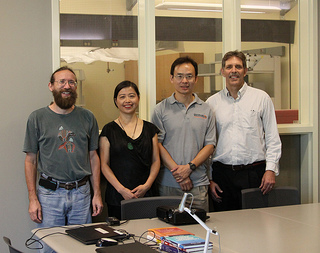New instrument to enable cutting-edge biology research at Oklahoma State University
Friday, September 13, 2013

The National Science Foundation has awarded a three-year grant of more than half million
dollars to a multi-disciplinary research team with 17 investigators for acquisition
of a unique, state-of-the-art infrared spectroscopic and imaging system to establish
a new research facility at Oklahoma State University.
Funded through the premier NSF major research instrument (MRI) program, the project
will be led by Aihua Xie, professor of physics at and Fellow of American Physical
Society, in close collaboration with professors Robert Burnap, Junpeng Deng and Wouter
Hoff.
This integrated, cutting-edge infrared spectroscopic and imaging system will enable
unprecedented accuracy in the collection of information about function and formation
of proteins, cells and tissues. It will support six independent types of experiments,
including very fast measurements (up to 10 nanoseconds) and very low temperature measurements
(down to -450 degrees Fahrenheit) of proteins and materials. It will also provide
chemical imaging of single living cells.
This advanced system will have broad applications in biology, chemistry, material
science and bio-engineering, including drug-protein interactions, development of vaccines,
bioenergy and cancer diagnosis.
“Work in these areas is truly cutting edge and I congratulate Dr. Xie and her colleagues
on this award,” said Dr. Stephen McKeever, vice president for research and technology
transfer.
The system will be housed in the new Infrared Core Facility Lab at the Henry Bellmon
Research Center on the OSU-Stillwater campus. It will have multidisciplinary users
from a total of 17 research groups: 13 users are from OSU, one is from the University
of Oklahoma, one is from California, and two are from New York.
The group is also in the process of establishing the Oklahoma Center for Infrared
Biology, which will advance research like this throughout the state. Approximately
one quarter million dollars is also being provided through cost share by OSU Department
of Physics, OSU College of Art and Sciences, and OSU Vice President Office for Research
and Technology Transfer.
